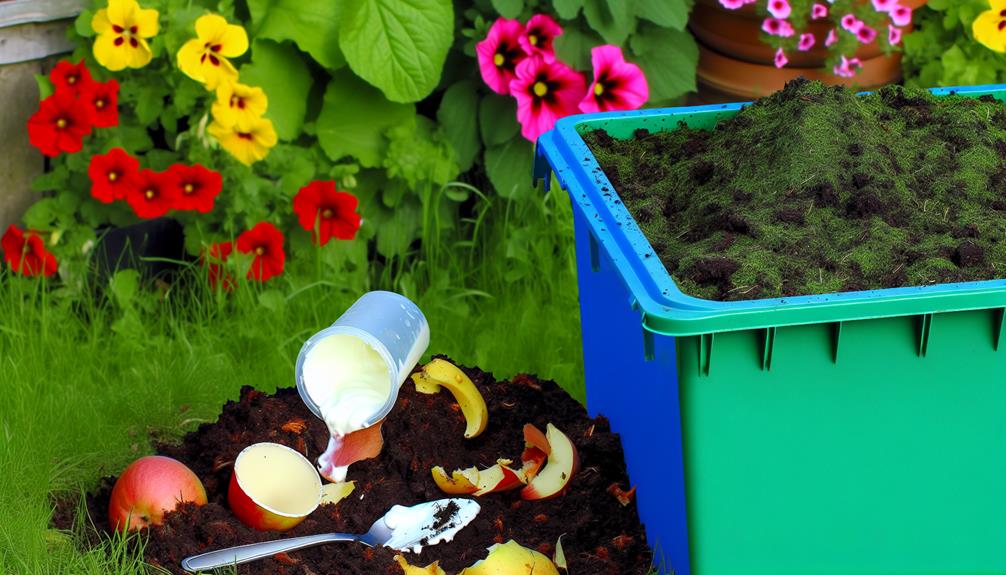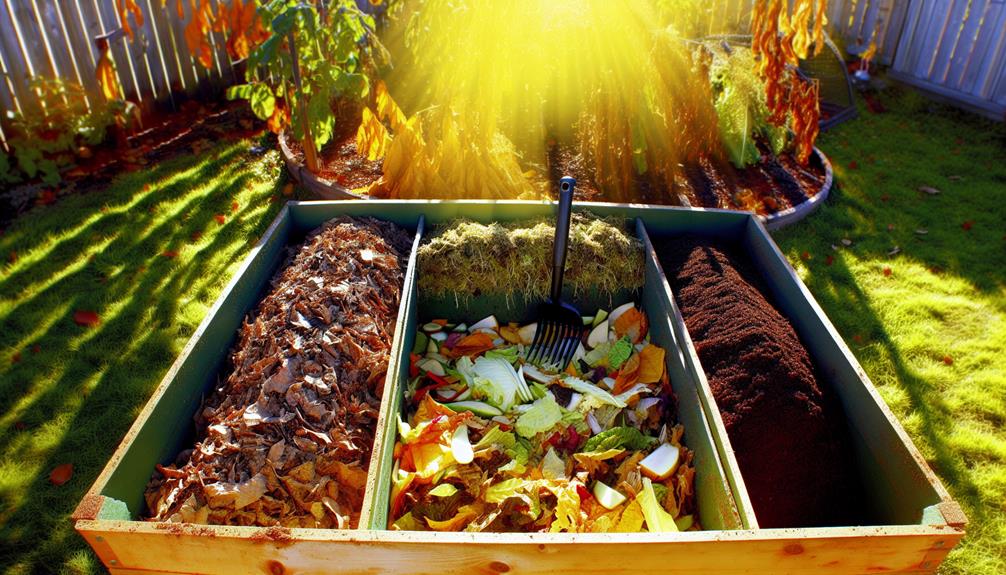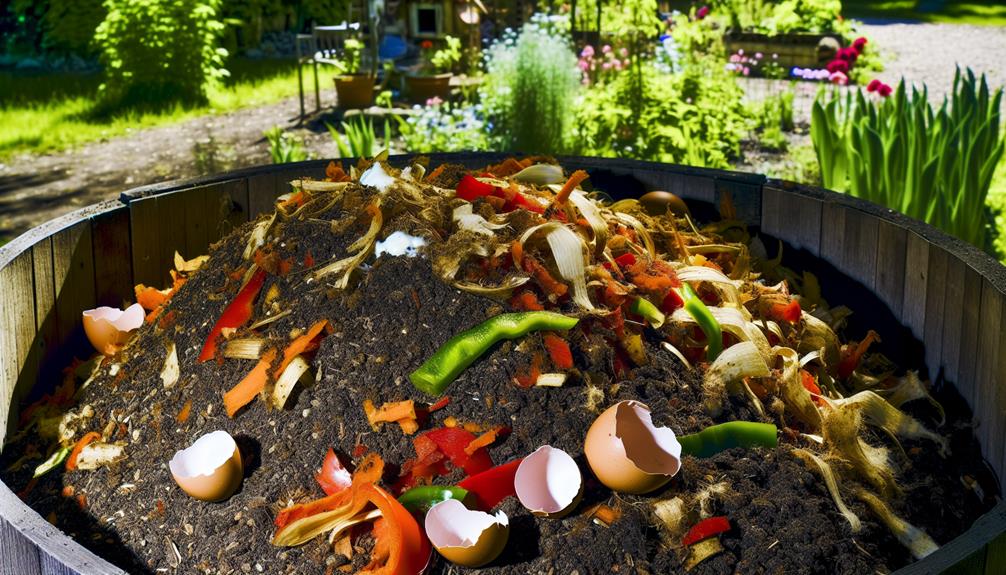

Yes, you can compost yogurt. It adds valuable nutrients and beneficial bacteria to your compost. However, it’s important to compost yogurt properly to avoid attracting pests and producing unpleasant odors. Mix yogurt with carbon-rich materials like dried leaves or straw, and place it in the center of your pile.
This guarantees better decomposition and reduces odor. Turn the compost pile regularly for good aeration and to speed up the breakdown process. Add yogurt in small amounts to maintain balance. These steps help you manage your compost effectively, and there’s even more to learn about optimizing your compost pile.
When it comes to composting, understanding the basics of both yogurt and composting methods is important. Yogurt is rich in nutrients like calcium, protein, and beneficial bacteria, making it a potentially valuable addition to your compost pile. These yogurt nutrients can help enrich the compost, which in turn nourishes your garden soil.
However, knowing the composting fundamentals is vital to make sure you’re doing it right. Start by creating a balanced compost pile with a mix of green and brown materials. Green materials include kitchen scraps like fruit and vegetable peelings, grass clippings, and coffee grounds. Brown materials consist of dried leaves, straw, and cardboard. Yogurt, although a dairy product, can be part of the green materials due to its nutrient content.
To compost yogurt effectively, don’t add too much at once. Mix small amounts thoroughly with other green materials to avoid attracting pests. Make sure your compost pile is well-aerated and turned regularly. This promotes decomposition and helps maintain the balance necessary for effective composting.
Also Read: Can You Compost Barbecue Sauce?
Dairy products like yogurt can attract pests and produce unpleasant odors if not composted properly. When you add yogurt to your compost pile, its high moisture content and tendency toward dairy spoilage can quickly create an unwelcoming environment.
Spoiled dairy can emit strong, sour smells that not only make your compost area unpleasant but can also attract unwanted visitors like rodents and insects. To effectively manage odor control, you must balance the yogurt with plenty of dry, important, carbon-rich materials. Items like dry leaves, straw, or shredded paper can help absorb excess moisture and mitigate bad smells.
By layering these materials with your yogurt, you’ll create a compost pile that breaks down more efficiently without the offensive odors. Another significant consideration is the rate of decomposition. Dairy products break down slower than other compostable items, so turning your compost pile more frequently can help speed up the process and reduce the chance of persistent odors.
Regularly monitoring your compost’s moisture levels and ensuring good aeration will further assist in maintaining a balanced pile.
Also Read: Can You Compost Artichoke?
To compost yogurt safely, start by incorporating it into the center of your pile where decomposition is most active. This guarantees that aerobic bacteria, which thrive in oxygen-rich environments, can break down the yogurt effectively. These bacteria are vital for a healthy composting process and help minimize odors.

When adding yogurt to your compost bins, it’s important to balance it with plenty of carbon-rich materials like leaves, straw, or shredded paper. This balance helps maintain the right conditions for aerobic bacteria to do their work. Too much yogurt or other dairy products can create a dense, anaerobic environment, leading to unpleasant smells and slower decomposition.
Turn your compost pile regularly to introduce oxygen, which supports the growth of aerobic bacteria. This practice also helps distribute the yogurt and other materials evenly, promoting faster and more efficient composting.
If you’re using a compost bin, consider adding yogurt in small amounts to avoid overwhelming the system.
Yogurt isn’t just for eating; you can also use it in various creative and practical ways. One popular alternative use is yogurt skincare. The natural probiotics and lactic acid in yogurt can do wonders for your skin. You can create a simple face mask by applying plain yogurt directly to your face. Leave it on for about 15-20 minutes before rinsing off with warm water. This can help exfoliate dead skin cells, moisturize, and even out your skin tone.
Another fantastic use for yogurt is yogurt marinating. Yogurt makes an excellent marinade base due to its acidity, which helps tenderize meat. For a basic yogurt marinade, mix plain yogurt with your favorite spices and herbs, such as garlic, cumin, and paprika. Coat your meat thoroughly and let it marinate in the refrigerator for at least a few hours, or overnight for best results. This method not only enhances the flavor but also results in juicy, tender meat.
Also Read: Can You Compost Baking Soda?
By including yogurt in your compost pile, you can greatly enhance its nutrient content and microbial activity. Yogurt is rich in calcium, protein, and beneficial bacteria, which can greatly boost the quality of your compost. The nutrient benefits of yogurt help to create a more balanced and fertile compost, ideal for enriching your garden soil.

To get started, mix yogurt with other organic materials like fruit and vegetable scraps, coffee grounds, and yard waste. This combination guarantees a good balance of green and brown materials, essential for effective composting. Remember, a healthy compost pile relies on maintaining the right moisture levels and aeration. Turn your pile regularly to keep it well-aerated, promoting the breakdown of materials.
The microbial activity in yogurt accelerates the decomposition process. The beneficial bacteria in yogurt help break down organic matter more efficiently, leading to faster compost production. Introduce small amounts of yogurt gradually to avoid overwhelming your compost pile.
Incorporating yogurt into your composting routine not only diverts waste from landfills but also fosters a sense of community and shared responsibility for the environment. Embrace this practice and watch your garden thrive with the nutrient-rich compost you create.
You can compost flavored yogurt, but avoid those with artificial flavor additives. Always check if the dairy alternatives are compostable too. By composting responsibly, you’re contributing to a healthier, more sustainable community.
Yes, it’s safe to compost expired yogurt. You’ll enhance your compost’s nutrient contribution and enjoy bacterial benefits that promote a healthy, thriving compost community. Embrace the practice, and your garden will thank you!
In the decomposition process, yogurt typically takes a few weeks to a couple of months to break down, depending on environmental factors like temperature and moisture. You’ll help the community by promoting a greener planet through composting!
Yes, yogurt can attract pests to your compost pile. However, using pest deterrents and ensuring proper compost aeration will help. By taking these steps, you’ll maintain a healthy compost environment and feel part of the eco-friendly community.
For best results, you should mix yogurt with other compost materials in proper ratios. This helps maintain nutrient balance and reduces odors. By doing this, you’ll contribute to a healthier compost pile and community garden.
To sum up, you can compost yogurt with careful consideration. Keep quantities small to avoid attracting pests and creating odor issues. Balance with plenty of brown materials like leaves or cardboard to maintain a healthy compost pile.
Alternatively, use yogurt in soil to boost beneficial microbes. By following these guidelines, you’ll effectively incorporate yogurt into your composting routine, enhancing nutrient content without compromising the pile’s balance or hygiene.
